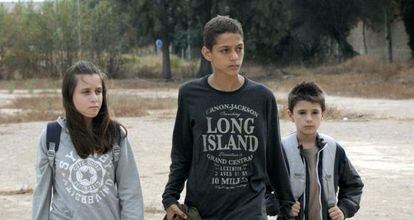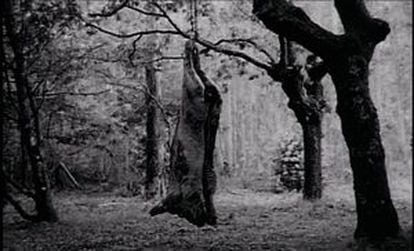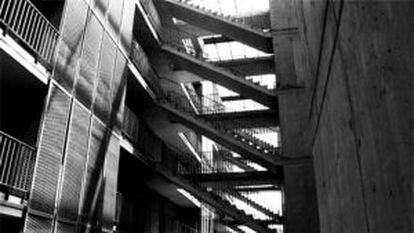The other Spanish cinema
Makers of less-commercial films are increasingly turning to alternative venues


"In reality this other Spanish cinema is so trendy that, at this rate, it will end up becoming the mainstream of Spanish cinema." This statement from a film programmer sounds like a joke, but it sums up the feelings of an extensive group of Spanish creators, all of whom are unable to find movie theaters willing to screen their films in their home country, despite having won prizes at international festivals. Some specialist film publications group almost 50 directors in this collective, but many of them deny they have anything in common. "What unites them is the will to make free cinema, although each one has their own creative influence. At the moment I don't dare call it a movement," says José Luis Cienfuegos, director of the Seville European Film Festival. This year's edition, which runs until Saturday, has been screening some of these films under its Resistances strand, which was dreamt up for the 2012 festival.
In reality the phenomenon has been building for the last five years: a group of Spanish filmmakers started to win prizes at international festivals and made a splash in the media, but their works were seen in very few places. On the one hand were the Galician creators grouped around producer Martin Pawley; on the other were filmmakers such as the Los Hijos collective, whose works were praised at some of the more daring festivals, such as Pamplona's Punto de Vista, and in publications such as website Blogs&Docs. A third group comprised Madrid-based directors led by Jonás Trueba - son of Oscar winner Fernando - and Javier Rebollo, director of La mujer sin piano, as well as other isolated creators dotted around Spain. To all of them, the doors of the mainstream movie houses were closed.

That is why film programmers at alternative cinemas, cultural centers, film archives and multipurpose museum spaces suddenly gained importance in the group's development. Fran Gayo, head of the BAFICI independent film festival in Buenos Aires and film programmer at Avilés's Niemeyer Center - as well as the author of the statement that opened this article - notes: "Today Spanish cinema is more interesting than it was a decade ago. This whole boom is all very romantic and nice, but it is not profitable. The situation is very fragile - it is held up by toothpicks."
Two years ago Gayo brought together a group of these filmmakers at BAFICI - "Sergio Oksman, Jonás Trueba, Jorge Tur, Marçal Forés, Lois Patiño, Adrián Orr, Daniel Villamediana, Carla Subirana were there" - and in that way helped forge the connection between them and the filmgoers who want to see their works, giving birth to solid filmmakers such as Jonás Trueba, Los Hijos and Juan Cavestany.

Mikel Olaciregui is the head of the Cineteca film theater at Madrid's Matadero cultural center, where the phenomenon of Trueba's Los ilusos began. "Jonás was very clear from the beginning about how to distribute the film. [...] Here in Cineteca he started his tour, with which he has taken Los ilusos around the whole of Spain. Many more people saw it than if he had resorted to normal theaters. Today's cinema is separating from viewers, and in the new dominant culture in which viewers want to get involved, these creators are there talking to the audience."
As commercial cinemas hemorrhage viewers, the alternative venues fill up. "This gives sense to our existence," says Olaciregui.
Producer Martin Pawley, the soul of the Galician filmmaking scene that has given us names such as Eloy Enciso (Arrianos) and Alberto Gracia, also sees connections between these creators. "Beyond their common use of digital, they experience the same problems, they are aware that the industry model of the 1980s is dying, and they have faster access to the new trends."
Among this varied selection of filmmakers are names such as San Sebastián Golden Shell winner Isaki Lacuesta, Javier Rebollo, this year's Locarno winner Albert Serra, European Film Award nominee Neus Ballús, Carlos Vermut, Polo Menárguez and Alberto Morais, whose Las olas won in Moscow and whose new film Los chicos del puerto is released Friday. "First there were directors, then director-producers, today we are director-producer-distributors. Support and a vision of the future is lacking from the ICAA [government film institute]. Today there is a blooming out of necessity because we want to make films, relying on the pseudo-democratization of production methods. Little by little these margins will become the center."
'Stockholm' syndrome
The Spanish producer of the film Stockholm earlier this week said it was maintaining the reduced 4.99-euro price to see the movie in two Valencia cinemas despite only moderate results in its opening weekend.
The idea of reducing the ticket price for the movie came to Caballo Films following the incredible success of last month's Fiesta del Cine event, which offered cut-price tickets to filmgoers for three days, causing lines to form around the block outside cinemas. But it was hard to see any difference in the number of people who went to see Stockholm at the Abc Park and Babel movie theaters in Valencia - where a ticket to see it costs three euros below the norm - and the other 13 screens showing it around Spain.
"We are going to give ourselves time," says Borja Soler of Caballo Films. "We are not evaluating the performance of the movie as bad, though we hope it will improve. We are going to persevere and try to reach the same agreement we made in Valencia in other cities."










































